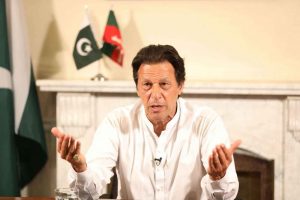In the drama over the Trump administration’s attitude towards Iran, a country that has not developed nuclear weapons, a crucial transition under way in the world’s only Muslim nuclear state is being ignored. It shouldn’t be.
Pakistan has the world’s sixth largest nuclear arsenal, fifth largest military and second largest population of Muslims. It also has, in the words of former acting CIA Director Michael Morell, a dysfunctional economy and a record of support to jihadists. Notably, the last redoubt of al-Qaeda leader Osama bin Laden was in Abbottabad, not far from the Pakistani capital, Islamabad.
All of this would be reason enough to pay close attention to Pakistan but there is more. Pakistan’s new prime minister took the oath of office on August 18, during the week of the 71st anniversary of Pakistan’s independence. In Prime Minister-designate Imran Khan’s first speech after winning the election July 25, he listed Pakistan’s relationship with Iran, Saudi Arabia and the Middle East — in that order — as very important.
The placement drew attention because it seemed to shuffle Pakistan’s view of its alliances in the Middle East. Traditionally, it has been close to Saudi Arabia but Pakistan’s incoming prime minister appeared to be indicating this may no longer be the case and that Tehran could have more importance in terms of alliances.
That may not strictly be true. Those with expertise in political parsing point out that Khan devoted only a short sentence to Iran and a much longer one to Saudi Arabia. His phraseology, too, is seen to be significant. “We want to improve ties with Iran,” Khan said, even as he described Saudi Arabia as “a friend who has always stood by us in difficult times.”
This matters, at the very least, as an interesting sidebar to the regional rivalry between Saudi Arabia and Iran and how it spills over to Pakistan. Islamabad has an outsized place in the Muslim world because of its status as a nuclear power.
Though Pakistan is not in the Middle East and North Africa region, it has long had key relationships with some of the main players. It has a 909km border with Iran and the world’s largest Shia population outside of Iran. Ironically, this makes Pakistan just as keen to maintain friendly relations with Iran as it is sensitive to Saudi concerns about a restive Shia minority influenced by Iran.
Pakistan’s ties with Saudi Arabia go back decades. It helped fight the 1979 siege of Mecca’s Grand Mosque; stationed military forces in Saudi Arabia during the Iran-Iraq war; collaborated with Riyadh in support of the mujahideen in 1980s Afghanistan; trained Saudi pilots and soldiers; and, as recently as February, sent 1,000 troops to Saudi Arabia to add to the 1,600 already there.
In return, the Saudis have provided direct financial aid and morale-boosting assistance in kind at strategic moments. In May 1998, for instance, the Saudis crucially helped Pakistan proceed to nuclear tests in response to those of India. Riyadh promised 50,000 barrels of free oil a day to offset the effect of Western economic sanctions.
Saudi support for a nuclear Pakistan is thought to rest on the belief Islamabad would respond in the event of an existential foreign threat to the House of Saud and Muslim holy sites.
Yoel Guzansky, formerly in Israel’s National Security Council and now a researcher at Tel Aviv’s Institute for National Security Studies, mused about Pakistan “openly granting [a] ‘nuclear umbrella’” to Saudi Arabia. Guzansky cited retired Pakistani Army chief Raheel Sharif’s promise in January 2016 that “any threat to Saudi Arabia’s territorial integrity would evoke a strong response from Pakistan.” A year later, Sharif was appointed head of a new counterterrorism alliance run out of Riyadh.
So how do the new Pakistani prime minister’s stated foreign policy priorities square with the above? Seemingly, they don’t, at least not neatly, but Khan’s successive ranking of Iran and Saudi Arabia may point to something else. He is following a script written by Pakistan’s military, which is more powerful than Turkey’s before it was restrained.
The Pakistani Army appears to have judged it best to hedge its bets, equivocate and assume a neutral posture with respect to the Middle East. In November, Pakistan’s army chief, General Qamar Javed Bajwa, made a 3-day official visit to Tehran, the first trip of its kind in decades. In July, his Iranian counterpart, Mohammad Bagheri, repaid the courtesy. Pakistan recently hosted Iranian, Russian and Chinese intelligence chiefs to discuss the Islamic State in Afghanistan. Meanwhile, Bajwa has visited Saudi Arabia many times. And more Pakistani troops are promised to Riyadh.
Clearly, Pakistan is neither abandoning Riyadh nor forswearing Tehran. It wants to stand between the two, looking both ways. Not only is that physically impossible, it may be politically and economically dangerous.


